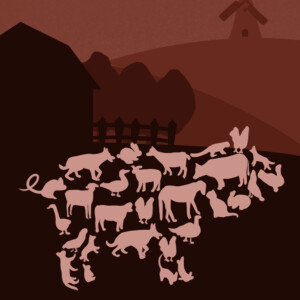
Thursday Aug 31, 2023
Animal Farm Unleashed: A Tale of Rebellion and Corruption
Chapter 1:What is Animal Farm
Animal Farm is a famous allegorical novella written by George Orwell, published in 1945. It tells the story of a group of farm animals who rebel against their human owner in pursuit of a society where all animals are equal. The animals establish their own self-governing farm based on the principles of animalism, which promotes equality and freedom from human exploitation.
As the story unfolds, the pigs, led by the clever and manipulative Napoleon, gradually seize power and establish a tyrannical regime, betraying the original principles of the revolution. The animals' hopes for equality are shattered as they witness the pigs becoming more like the humans they initially fought against.
Animal Farm is a satirical critique of the Russian Revolution and the subsequent Soviet Union under Joseph Stalin. Each animal represents specific historical figures or groups from that time period, such as Old Major symbolizing Karl Marx, Napoleon representing Stalin, and Snowball symbolizing Leon Trotsky.
The book explores themes of corruption, power, propaganda, and the manipulation of language. Animal Farm serves as a cautionary tale about the dangers of totalitarianism and the potential for revolutions to be co-opted by those seeking power.
Chapter 2:Why is Animal Farm so famous
Animal Farm, written by George Orwell and published in 1945, is renowned for its powerful allegorical portrayal of political systems and human nature. Here are some reasons why Animal Farm has gained significant fame:
Allegorical representation: Animal Farm uses animals as characters to represent different individuals, groups, or concepts found in society. Through this allegory, Orwell exposes the corruption, abuse of power, and manipulation often present in political systems.
Satire and criticism: Orwell's writing style combines satire, humor, and irony to criticize totalitarian regimes and political ideologies. By depicting the transformation of the farm from an idealistic society into a dictatorship, Animal Farm highlights the dangers of authoritarianism and serves as a cautionary tale.
Universal themes: The themes explored in Animal Farm are universal and relevant to various historical, social, and political contexts. The book explores topics such as power dynamics, propaganda, inequality, revolution, and the nature of corruption. These themes resonate with readers across time and cultures.
Engaging storytelling: Animal Farm is a relatively short novel that captivates readers through its engaging narrative structure. The plot progression, character development, and dramatic events keep readers invested in the story, allowing them to be emotionally connected to the animals' struggles and aspirations.
Historical significance: Animal Farm was published shortly after World War II when the world was grappling with the aftermath of fascist and communist regimes. Orwell drew inspiration from real-life events, particularly the Russian Revolution and Stalinist era, making the novel a poignant reflection on the failures and pitfalls of such systems.
Literary craftsmanship: Orwell's masterful use of language, vivid descriptions, and concise prose contribute to the book's enduring appeal. His ability to convey complex ideas and create memorable characters adds depth and richness to the narrative.
Chapter 3:Who do the pigs represent in Animal Farm
In George Orwell's allegorical novel "Animal Farm," the pigs represent the ruling class, specifically the Soviet Union's leadership under Joseph Stalin. The character Napoleon is an embodiment of Stalin, while Snowball represents Leon Trotsky, and Squealer symbolizes the propaganda machine used by the state. The pigs' gradual acquisition of power and their subsequent abuse of it mirror the corruption and authoritarianism that took place during Stalin's regime.
No comments yet. Be the first to say something!